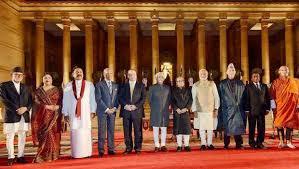
Among the regional groups of nations, the South Asia Association of Regional Cooperation, SAARC, is probably the most hopeless. In a region where the vast majority of population shares many common treats and features, the idea of regional integration never really took over.
Amid tensions among India and Pakistan and internal upheavals, the South Asian nations never had the commitment nor the capacity to focus on strengthening the many commonalities they share.
Unfortunately politics always have been highlighting the differences, the barriers among nations and people instead of leveraging on their similarities. This is unfortunate because what really counts when we talk about regional integration and the consequential pooling of national sovereignty is all about having the locals, the people on “board”.
Take a look at what is going on in Europe with the recent EU election: in what can be defined as the most advanced and sophisticated example of regional integration, the commoners feel disenchanted, abandoned and marginalized. They do not understand what is going on at regional level, why the decision making is so far and distant. Moreover in Europe people from different backgrounds and culture were bound together by the ashes of the Second World War. Imagine someone from Finland working together with someone from tiny Malta or a creative Italian working with a methodological German. It is somehow working; as they say “unity in diversity” but it is hard and painful.
Instead the greatest asset in terms of regional integration in South Asia is the fact that people are much similar to each other: I am not here saying that they are totally and culturally homogenous but share a great deal of interests and similarities: food, language, a love for cricket, a love for bolliwood movies.
While I know this might look like a generalization, I am strongly convinced that south Asians are really closer to each other then what they think.
So at least theoretically in South Asia it should come easier to create a regional “demos” of people from different nations, each sovereign but all sharing a common “belonging” and all projected towards a shared future.
Here comes Modi. The fact that the recently elected Indian prime minister invited at his swearing in ceremony all the SAARC leaders means a lot. Only with strong political will, the project of regional integration can restart and lead towards new heights. Modi could be the man.
There is so much that can be done to harness the power of regional integration: economically, politically and socially.
Obviously economy would come first as it can be the launch pad for other forms of integration, especially people to people centered. By boosting trade and economic opportunities, the wealth of the region can considerably increase and halve the number of people living in poverty. A new South Asia middle class could prosper.
Modi has all the quality of a strong, decisive politician and we all know all the controversies surrounding him. Still we have an opportunity here with his election.
The new prime minister of India can prove his leadership in creating the enabling conditions for the heads of state and common people of the region to start believing more in a common destiny for South Asia.
Why should the heads of state meet only once every two years? Why making the logistics of organizing the leaders’ summit an insurmountable obstacle?
We should ensure that different gatherings at all levels and in all sectors take place regularly. Ministers from education should regularly interact among them and have a common defined vision and strategy. For example, why not envisioning in 10 years time a regional educational space? Why not having a regional exchange program for students? Why not revising the school curriculum to highlight a common belonging?
At the present, just check the SAARC web site you can find many declarations void of any significance. Only political will can drive a new agenda for the development of the region.
The SAARC secretariat should be strengthened and empowered to advance new proposals and ideas for the region. Right now who really know who the Secretary General of the bloc is? Why not having someone with political weight instead of a burocrat as the helm of the secretariat? What about a former prime minister?
Establishing regular interactions among the member of parliaments of member nations could be another step. As shown by the European integration experience, having a supranational parliament does not solve all the problems. Yet having a parliamentarian dimension to the process of regional integration will be essential.
The common future of the region will not depend on India nor on Modi. It will up to the will of every single citizens living in South Asia.
Still the new prime minister of India can show resolve and determination in advancing the interests of millions of citizens in the region. Can he demonstrate sensitiveness and inclusiveness in accommodating the needs of smaller nations? Can he offer a political solution that meets the needs and expectations of common citizens?
Hopefully his symbolic gesture shown at his inauguration will be followed by an ambitious drive at regional level. We all need a nudge or better a push. Modi can do the job.








.png?itok=KI18yp23)

Add new comment